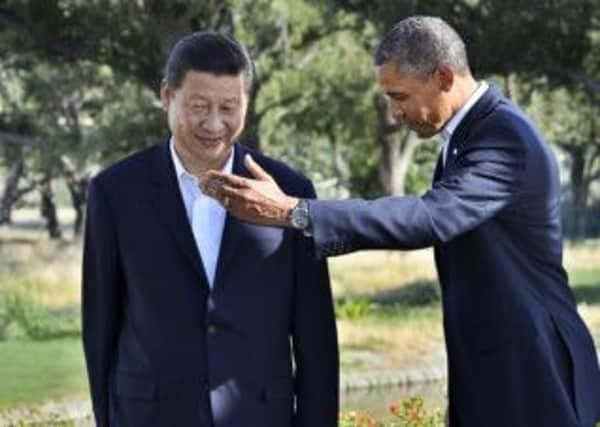PRISM row looms over US-China cyber-security talks


Obama described the contentious cyber issue as “uncharted waters”.
It has leaped to the fore domestically for Obama after it emerged his administration had sanctioned widespread surveillance since June 2010 on users of Google, Apple and Facebook, using its Prism spying system to eavesdrop.
Advertisement
Hide AdAdvertisement
Hide AdObama said cyber matters were discussed only broadly during the first round of talks with Xi, but pledged a fuller discussion would take place.
He said it was critical that the US and China reached a “firm understanding” on cyber issues, but stopped short of accusing China of orchestrating the hacking of US government and business computers.
“Because of the incredible advances in technology, the issue of cybersecurity and need for rules and a common approach for cybersecurity are going to be increasingly important,” Obama said during a news conference with Xi at the Sunnylands estate in the Californian desert near Rancho Mirage.
Xi, who assumed power in March, accepted no responsibility for China’s alleged actions. He said China was also a victim of cyber-spying but did not apportion blame.
Hours earlier, with temperatures soaring to more than 38C, the two leaders walked along a shaded path as they marked the start of their desert meetings. Underscoring the desire for an informal summit, Obama and Xi greeted one another in white shirts and jackets, but no ties.
US officials cast the get-together as an opportunity for Obama and Xi to hold candid, free-flowing talks on the many issues that define the relationship between the two countries, including the economy, climate change and North Korea’s nuclear provocations.
However, it is cybersecurity that has taken on increasing importance to the Obama administration in its recent talks with China.
Obama said advances in technology have created a need for clear protocols about what is acceptable or unacceptable for governments to do.“They’re going to have similar concerns,” Obama said of the Chinese.
Advertisement
Hide AdAdvertisement
Hide AdPushing back against the notion that the Prism surveillance controversy had undermined his credibility to take on China over cybersecurity, the US president insisted the two issues were different. He said concerns over hacking and intellectual property theft should not be confused with the separate debate over how governments collect data to combat terrorist threats. “That’s a conversation that I welcome,” he said.
China also has major concerns about cyber_security, Xi said, calling new technology a “double-edged sword” that could drive progress but could also cause headaches for governments and their regulators. Although he said China has been the victim of cyber attacks, he did not specify who was behind them. Speaking more broadly, Xi said he and Obama believed the two superpowers could approach each other in a way “that is different from the inevitable confrontation and conflict”.
Putting a positive spin on what has been a vexed issue between the US and China, Xi said the two nations should work together on cybersecurity. He said he was pleased that the US and China have established a working group to discuss this.
And he invited Obama to China for a similar meeting, pledging to continue talking by phone and exchanging letters with the US president.
Following their news conference, Obama and Xi attended a private working dinner at the estate on the edge of the Mojave desert. More talks were scheduled yesterday.
The presidents were originally scheduled to hold their first meeting of the year in September, on the sidelines of an economic summit in Russia. But both agreed there was a need to hold talks earlier.
“Our decision to meet so early signifies the importance of the US-China relationship,” Obama said as he opened the summit. He noted the unusual setting and said he hoped for “more extended” and informal talks that will lead to a “new model of co-operation” in the international arena.
Speaking through a translator, Xi said both leaders were “meeting to chart the future of US-China relations”. He added that the world has “reaped huge benefits” from their relationship.
Advertisement
Hide AdAdvertisement
Hide AdThough billed as an informal meeting, the first round of talks had the look of a standard diplomatic encounter. Obama and Xi sat on opposite sides of a long table, each flanked by aides. US and Chinese flags were stationed at the head of the table and note-takers sat off to the side.
On the issue of cybersecurity, the US has started bringing its complaints about Chinese computer-hacking into the open after years of quiet and unsuccessful diplomacy.
It has accused Beijing’s government and military of computer-based attacks against America. While there have been no admissions of guilt, Chinese leaders have started acknowledging there is a problem and US officials say the Chinese seem more open to working with the US to address it.
On the economic front, US manufacturers have long contended that China is manipulating its currency to gain a trade advantage. The US trade deficit with China is its largest with any single nation. The US government, however, has declined to label China a currency manipulator.